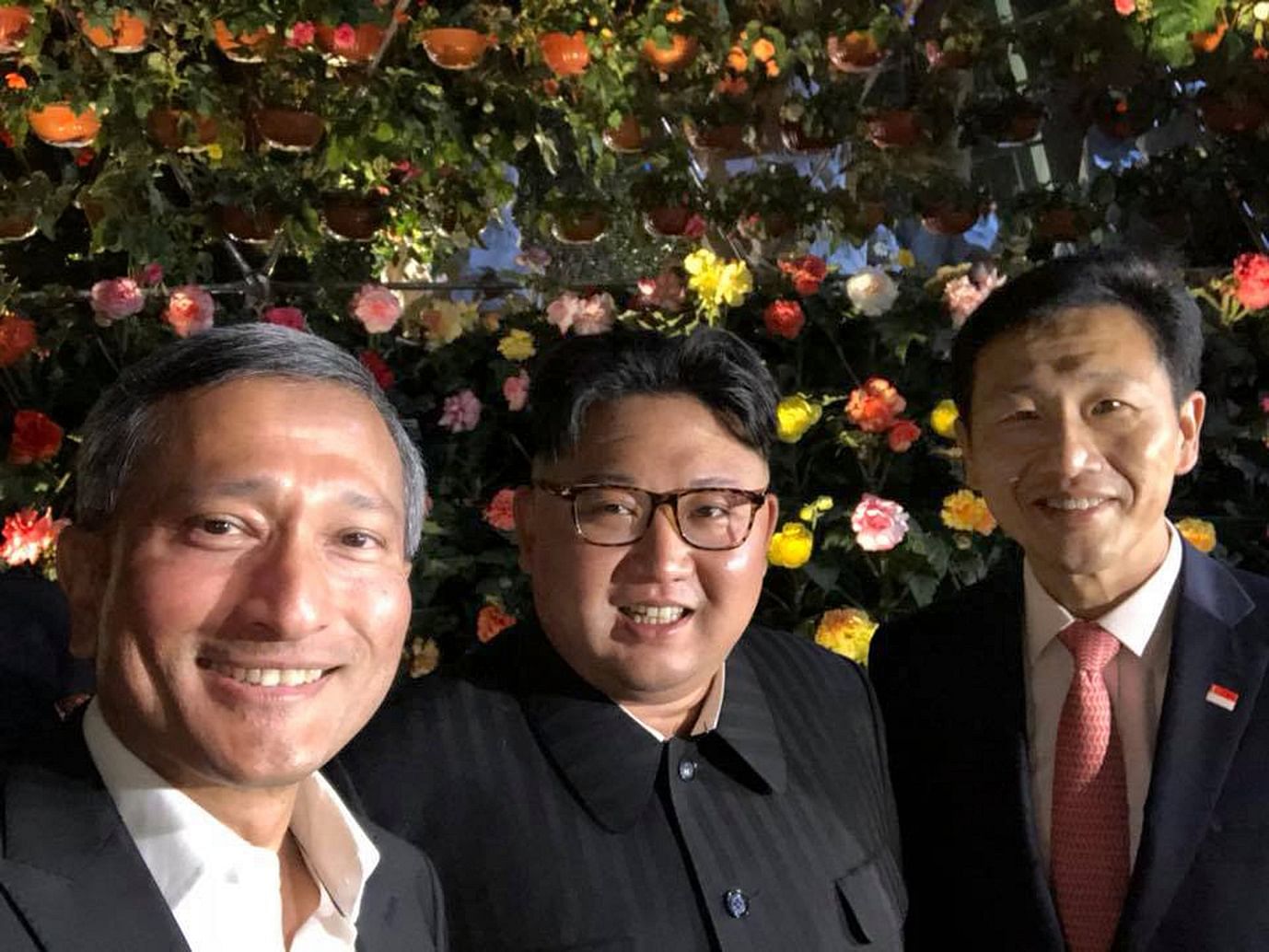At 1.41pm yesterday, history was made as American President Donald Trump and North Korean leader Kim Jong Un signed an agreement described by the former as "a pretty comprehensive document" and that the latter promised would lead the world to "see a major change".
Mr Trump said there was a lot of goodwill in his meeting with Mr Kim and that the agreement will "take care of a very big and very dangerous problem" in the world.
Compared to the mutual insults and talk of war just months ago, it was momentous to see the two leaders front a joint signing ceremony and tell the world they would work together on a new path towards peace.
Initial reports said Mr Kim committed to "complete denuclearisation" amid pledges of a new era of United States-North Korea relations to build a lasting peace on the Korean peninsula.
While the vision of peace is grand and promising, much depends on how the process of negotiations pans out and, importantly, whether and how firmly the agreement truly locks North Korea on a peaceful development path.
Whatever the final outcome, the fact that the summit took place was significant enough. It was fitting that the historic summit and agreement between the mercurial deal-making US president and the path-breaking leader of North Korea should take place in Singapore.
For ours is a country built from the imagination and will of a people, an improbable country, a collection of motley peoples forged into a First World nation; a place where imagination and hope have always trumped existential improbability and physical constraints.
In that sense - as a nation that overcame the odds to become a respected, successful First World nation - perhaps Singapore can fire the imagination of North Korea's leaders and people on what is possible when a country puts its mind and will to building a peaceful and prosperous nation.
The signing of the agreement came after a four-eye meeting that began at 9am and lasted about 45 minutes. This was followed by a working lunch with officials that ended in a friendly stroll around the courtyard at the Capella Singapore hotel on Sentosa. For Capella and the resort island of Sentosa, the event will no doubt prove a major marketing boost.

REPUTATIONAL HIGH
For Singapore, as host, the summit marks a reputational high. The choice of Singapore as venue attests to its position as an honest, neutral broker, and as a safe, secure city capable of hosting such a major event.
This was reflected in the tone of international media reports. There was some residual commentary on Singapore's supposedly repressive state; but writers like Tyler Cowen, writing in Bloomberg, have a finer understanding of Singapore's political system. In a commentary on what both the US and North Korea can learn from Singapore, he singled out the country's excellent public service, its healthcare system and the Government's responsiveness to public opinion.

Concluding, he noted the caricature of Singapore as authoritarian, and debunked that notion, adding: "These days, it is best to think of Singapore as a democracy with legitimate elections, although it is a democracy with some restrictions on political entry and political speech (attacking political figures by name and character can lead to expensive libel suits).
"The most significant barrier to entry probably is that the dominant political party, the People's Action Party, has amassed so much talent, and is such a vehicle for career advancement, that potential competitors find it hard to mount serious challenges."
Few fair-minded Singaporeans would disagree with that description.
More significantly, Singapore's impact on this historic event can go beyond that of hosting the summit, to being a place that might shift North Korean views of its own place in the world.
That Mr Kim wants to draw on Singapore's experience was made explicit in a North Korean state media report on Mr Kim's night tour of Singapore on Monday. The report said: "Going round the Great Flower Garden, one of the prides of Singapore, Sky Park located on the roof of the world-famous Marina Bay Sands building and Singapore Port, he learnt about the social and economic development of the Republic of Singapore."
The report added that Mr Kim "is going to learn a lot from the good knowledge and experience of Singapore in various fields in the future".
If Singapore has a place in the North Korean imagination of its own future, what might that consist of?
I can think of several factors.
ECONOMIC PROWESS, SOCIAL ORDER
First, Singapore has the mix of economic prowess and socio-political order that strong leaders love.
Watching the images of Mr Kim touring Gardens by the Bay on Monday night, I couldn't help wondering what was going on in his mind.
Was he briefed about how the Gardens was an oxymoron - a nature park that is artificially constructed, brought into being by will and imagination? Did he know about the engineering, horticultural and environmental care required to keep the varied plants in bloom in the climate-controlled yet sustainably-cooled Flower Dome and Cloud Forest of the Gardens?
What lesson might he take away from this tiny island-state's derring-do?
North Korea after all, was economically more advanced than the South 70 years ago. Decades of economic and international isolation impeded its progress. If it starts to open its economy and allows more freedoms into its society, what can it achieve?
IN CHARGE OF OWN DESTINY
This brings me to another factor that might fire the North Korean imagination: Singapore is master of its own destiny.
Singapore has maintained a consistent stand, in the face of loud Western opprobrium, that it alone will determine its domestic political development, and evolve in a direction and at a pace that is good for its people, unfettered by ideology and devoid of external pressures.
FRIENDS TO ALL
Singapore's diplomacy has also been founded on being friends to all. It has steadfastly befriended both the US and China, for example. In hosting both Mr Trump and Mr Kim, it has to do its best to be even-handed and make both welcome.
One small, telling moment of Singapore's warm diplomacy in action came on Monday night.
Foreign Minister Vivian Balakrishnan posted a wefie with Mr Kim, who was flanked by Dr Balakrishnan and Education Minister Ong Ye Kung, at Gardens by the Bay.
In official photos, Mr Kim's bouffant fringe and broad, smooth face gives little away. In the photo posted by Dr Balakrishnan, Mr Kim looks relaxed and engaged. His eyes are lively; his smile a little askew; he looked like a man who was enjoying his walk.
As Foreign Minister, Dr Balakrishnan would have had a few interactions with Mr Kim. He was on hand with Mr Ong at Changi Airport to welcome Mr Kim off the plane when the North Korean leader landed in Singapore at 3pm on Sunday. Both men were at the Istana when Mr Kim met Prime Minister Lee Hsien Loong. They took Mr Kim jalan jalan (walking), on a night walk around the Marina Bay area in the evening. In that short time, the two Singapore hosts got Mr Kim visibly relaxed.
While some may consider it unwise for Singapore and its leaders to give North Korea's regime and its leader a gloss of respectability with such a warm reception, the truth is that the world has everything to gain from nudging North Korea to become a full, civil member of the international community, and nothing to gain from treating it as a pariah and forcing it to return to its nuclear fire-and-brimstone threats and actions.
Might North Korea realise the value of diplomacy, following this successful meeting? Might it start making friends with more countries? Can the US give North Korea a security guarantee strong enough for it to give up its long-range nuclear arsenal, and for it to start making friends beyond its main ally China?
As world attention trains on North Korea this week, and Mr Kim meets the world superpower's leader as an equal, it is easy to forget that North Korea remains an underdog nation in the world.
Singapore too was an underdog nation at independence, a tiny, multi-ethnic society with no hinterland and few natural resources beyond a natural deep sea port. It has overcome restraints to build a First World city, while retaining control of its own destiny.
North Korea today is an underdog nation, economically weak, internationally isolated. While Mr Kim seeks security guarantees and economic advancement for his country, he will certainly also want national self-determination.
Perhaps being in Singapore these few days will remind Mr Kim and his fellow North Korean leaders about what is possible: that it is possible to open up economically; and evolve domestically at its own pace in a way that its people can accept; while retaining control of its own destiny.
In the end, Singapore's contribution to the summit might go beyond the fact that it provided the venue and hosted the event.
As PM Lee said in an interview with CNN: "We hope that by providing a venue which is neutral, which is agreeable to both sides, we enable a productive summit to take place which will turn around the negative trend of events in Korea over the last few months and set Korea on to a new and positive trajectory - for them and for the world.
"We hope that in this environment, they will have a sense of the way the region is, the potential for the prosperity, stability and security in the region, in Asia, and what that can mean for the world. And therefore a sense of the responsibility they have - the two sides - to come to some kind of a constructive outcome."
If Singapore in some small way shifts the mindsets of North Koreans when they envision a future for their country, to one that is both peaceful and prosperous, nudging it towards integration with the world and greater economic development, then we would have had an impact on the world far greater than we could have hoped for when we agreed to host the event.
It is not impossible. Improbable maybe, but this was always an improbable summit, held in an improbable nation.
• This article first appeared online at www.straitstimes.com yesterday.
Correction note: An earlier version of the article described Tyler Cowen as a Bloomberg journalist. He is an economics professor who writes for Bloomberg. We are sorry for the error.

